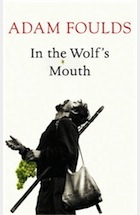Adam Foulds: 'As a kid my nightmares weren't about generic monsters, but real violence and hatred'
The poet and novelist on his latest book, a war story set in Africa and Sicily, and how poetry increasingly informs his prose

'I like it when the lines behave just as they want' … Adam Foulds. Photograph: Eamonn Mccabe for the Guardian
About a third of the way into Adam Foulds's latest novel – In the Wolf's Mouth, a second world war story set in north Africa and Sicily – one of his protagonists, a young American soldier, finds himself having to run through a battlefield to escape German fire. As he begins to negotiate the mayhem, so the words on the page start to float apart. "Running, burn of ankle twist over // Like people, shaped like people? // over rocks. Behind rocks, a piece of sky". In effect, Foulds's prose breaks down and dissolves into poetry.
 "I like it when the lines behave just as they want in terms of crossing the page or not," explains Foulds. "What is most important is getting as close as I can to the reality I'm trying to describe." As both a prize-winning poet and novelist, it is little surprise that Foulds should adopt such techniques. But he is also aware that when a reviewer describes a book as a "poet's novel", it is not usually meant as a compliment, and is a description that often comes with a hint of oversensitivity and overwriting. "I do know what they mean," Foulds says. "But I also think that to use 'poetic' as a criticism in that sense displays a not very accurate understanding of what good poetry is. Great poetry such as William Wordsworth's The Prelude is not 'poetic' in that sense, in that it is full of the brilliant accuracies of description you find in good prose. Really good poetry is about intensity, and a freshness of language and seeing. And that is also true of DH Lawrence or Virginia Woolf or lots of other writers' prose. So for me it is more about wanting language and perception to be alive and sensually immersive, none of which is what I think people mean when they say 'poetic'."
"I like it when the lines behave just as they want in terms of crossing the page or not," explains Foulds. "What is most important is getting as close as I can to the reality I'm trying to describe." As both a prize-winning poet and novelist, it is little surprise that Foulds should adopt such techniques. But he is also aware that when a reviewer describes a book as a "poet's novel", it is not usually meant as a compliment, and is a description that often comes with a hint of oversensitivity and overwriting. "I do know what they mean," Foulds says. "But I also think that to use 'poetic' as a criticism in that sense displays a not very accurate understanding of what good poetry is. Great poetry such as William Wordsworth's The Prelude is not 'poetic' in that sense, in that it is full of the brilliant accuracies of description you find in good prose. Really good poetry is about intensity, and a freshness of language and seeing. And that is also true of DH Lawrence or Virginia Woolf or lots of other writers' prose. So for me it is more about wanting language and perception to be alive and sensually immersive, none of which is what I think people mean when they say 'poetic'."
More
 "I like it when the lines behave just as they want in terms of crossing the page or not," explains Foulds. "What is most important is getting as close as I can to the reality I'm trying to describe." As both a prize-winning poet and novelist, it is little surprise that Foulds should adopt such techniques. But he is also aware that when a reviewer describes a book as a "poet's novel", it is not usually meant as a compliment, and is a description that often comes with a hint of oversensitivity and overwriting. "I do know what they mean," Foulds says. "But I also think that to use 'poetic' as a criticism in that sense displays a not very accurate understanding of what good poetry is. Great poetry such as William Wordsworth's The Prelude is not 'poetic' in that sense, in that it is full of the brilliant accuracies of description you find in good prose. Really good poetry is about intensity, and a freshness of language and seeing. And that is also true of DH Lawrence or Virginia Woolf or lots of other writers' prose. So for me it is more about wanting language and perception to be alive and sensually immersive, none of which is what I think people mean when they say 'poetic'."
"I like it when the lines behave just as they want in terms of crossing the page or not," explains Foulds. "What is most important is getting as close as I can to the reality I'm trying to describe." As both a prize-winning poet and novelist, it is little surprise that Foulds should adopt such techniques. But he is also aware that when a reviewer describes a book as a "poet's novel", it is not usually meant as a compliment, and is a description that often comes with a hint of oversensitivity and overwriting. "I do know what they mean," Foulds says. "But I also think that to use 'poetic' as a criticism in that sense displays a not very accurate understanding of what good poetry is. Great poetry such as William Wordsworth's The Prelude is not 'poetic' in that sense, in that it is full of the brilliant accuracies of description you find in good prose. Really good poetry is about intensity, and a freshness of language and seeing. And that is also true of DH Lawrence or Virginia Woolf or lots of other writers' prose. So for me it is more about wanting language and perception to be alive and sensually immersive, none of which is what I think people mean when they say 'poetic'."More

No comments:
Post a Comment